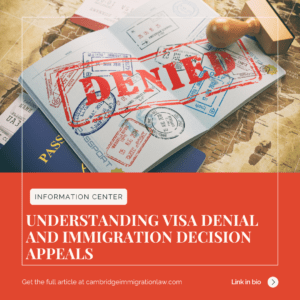UNDERSTANDING VISA DENIAL AND IMMIGRATION DECISION APPEALS

UNDERSTANDING VISA DENIAL AND IMMIGRATION DECISION APPEALS
Facing a visa denial or adverse immigration decision can be disheartening, but it’s essential to know that avenues for appeal exist. Whether it’s a refusal of a visa application, an adjustment of status denial, or a deportation order, understanding the process and your rights is crucial in navigating this complex terrain.
Upon receiving a visa denial or unfavorable immigration decision, the first step is to determine whether the specific case allows for an appeal. Not all decisions are appealable, and the eligibility criteria vary based on the type of visa or immigration benefit sought. Generally, if a denial stems from a misinterpretation of facts, legal errors, or procedural irregularities, it may be grounds for an appeal. It’s crucial to act swiftly, as there are typically strict timelines for filing an appeal, and missing these deadlines can limit your options.
Navigating the appeals process can be intricate, involving the submission of a Notice of Appeal to the Administrative Appeals Office (AAO) or the Board of Immigration Appeals (BIA), depending on the nature of the decision. This stage requires a thorough understanding of the legal basis for the appeal, and the assistance of an experienced immigration attorney can be invaluable.
Seeking legal counsel is often advisable when appealing a visa denial or immigration decision. A knowledgeable immigration attorney can assess the grounds for appeal, gather necessary evidence, and present a compelling case on your behalf. Their expertise can significantly enhance the chances of a successful appeal. Whether it’s presenting new evidence, arguing legal points, or addressing procedural errors, having a skilled attorney by your side ensures that your rights are protected and every avenue for appeal is explored.
Remember, each case is unique, and consulting with legal professionals ensures tailored strategies for the best possible outcome. The appeals process offers a mechanism to rectify unjust outcomes, and with proper guidance, individuals can navigate the complexities with confidence, striving for a positive resolution and the realization of their immigration goals.


Comments are closed.